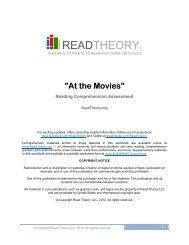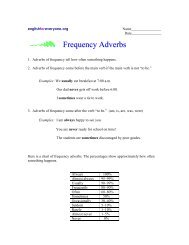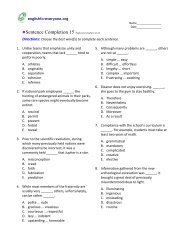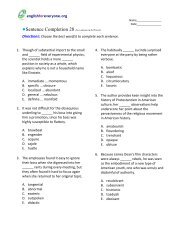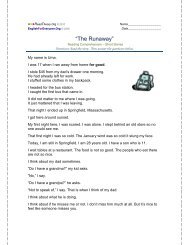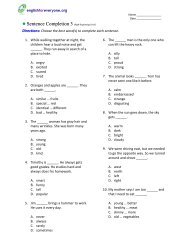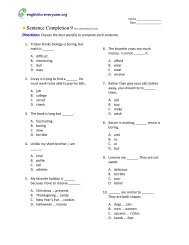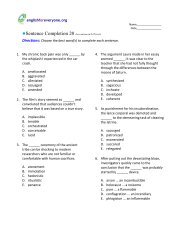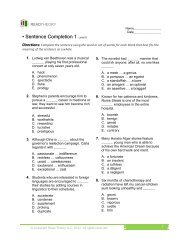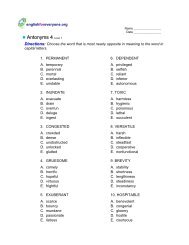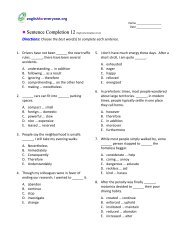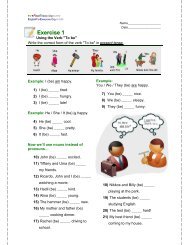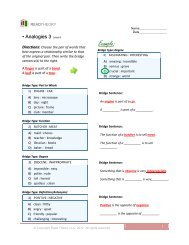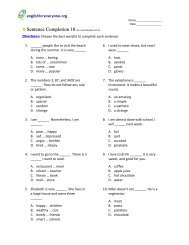• Antonyms 1 - English for Everyone
• Antonyms 1 - English for Everyone
• Antonyms 1 - English for Everyone
Create successful ePaper yourself
Turn your PDF publications into a flip-book with our unique Google optimized e-Paper software.
READTHEORY<br />
<strong>•</strong> <strong>Antonyms</strong> 1 Level 10<br />
© Copyright Read Theory LLC, 2012. All rights reserved.<br />
Name________________<br />
Date________________<br />
Directions: Choose the word that is most nearly opposite in meaning to the word in capital letters.<br />
1. UNAPPROACHABLE<br />
A. casual<br />
B. impenetrable<br />
C. unclear<br />
D. withdrawn<br />
E. accessible<br />
2. INSERT<br />
A. adhere<br />
B. admit<br />
C. extract<br />
D. boost<br />
E. embed<br />
3. EVERYDAY<br />
A. eerie<br />
B. unruly<br />
C. routine<br />
D. tedious<br />
E. familiar<br />
4. DEMOLISH<br />
A. raze<br />
B. impair<br />
C. generate<br />
D. elevate<br />
E. endorse<br />
5. UNSETTLED<br />
A. vague<br />
B. indeterminate<br />
C. straight<strong>for</strong>ward<br />
D. accurate<br />
E. conclusive<br />
6. CEREMONIOUS<br />
A. momentous<br />
B. stately<br />
C. proper<br />
D. in<strong>for</strong>mal<br />
E. offensive<br />
7. UNKNOWN<br />
A. celebrated<br />
B. secret<br />
C. exotic<br />
D. successful<br />
E. irrelevant<br />
8. MINIMUM<br />
A. valley<br />
B. median<br />
C. apex<br />
D. mean<br />
E. floor<br />
9. FORTIFY<br />
A. dispute<br />
B. alarm<br />
C. support<br />
D. sap<br />
E. intensify<br />
10. BIASED<br />
A. inclined<br />
B. disastrous<br />
C. neutral<br />
D. unfair<br />
E. injurious<br />
1
Answers and Explanations<br />
1) E<br />
The word unapproachable means unreachable or impossible to get near. A person can be unapproachable if he or she is<br />
distant, cold, or standoffish. The opposite of unapproachable is approachable. Because accessible means easy to<br />
approach, choice (E) is correct.<br />
(A) is incorrect because casual means in<strong>for</strong>mal. This is not the opposite of unapproachable.<br />
(B) is incorrect because impenetrable means inaccessible or impossible to enter. This is practically synonymous with<br />
unapproachable, not the opposite of it.<br />
(C) is incorrect because unclear means vague or uneasily understood. This is not the opposite of unapproachable.<br />
(D) is incorrect because withdrawn means shy. This is not the opposite of unapproachable.<br />
2) C<br />
The word insert means to put or place inside. If one inserts a letter into an envelope, he or she is adding that letter to the<br />
envelope. The opposite of insert is to take out or remove. Because extract means to take out or remove, choice (C) is<br />
correct.<br />
(A) is incorrect because adhere means to stay attached. This is not the opposite of insert.<br />
(B) is incorrect because admit means to allow in. This is nearly synonymous with insert, not the opposite of it.<br />
(D) is incorrect because boost means to advance or promote. This is not the opposite of insert.<br />
(E) is incorrect because embed means to fix into a surrounding area or mass. This is not the opposite of insert.<br />
3) A<br />
The word everyday means ordinary or commonplace. An everyday occurrence is something that happens regularly. The<br />
opposite of everyday is uncommon or strange. Because eerie means weird or unusual, choice (A) is correct.<br />
(B) is incorrect because unruly means disobedient. This is not the opposite of everyday.<br />
(C) is incorrect because routine means commonplace. This is synonymous with everyday, not the opposite of it.<br />
(D) is incorrect because tedious means boring or tiring. This is not the opposite of everyday.<br />
(E) is incorrect because familiar means commonly known or seen. This is not the opposite of everyday.<br />
4) C<br />
The word demolish means destroy or ruin. When someone demolishes a building, he or she eliminates it. The opposite of<br />
demolish is produce or build. Because generate means bring into existence or create, choice (C) is correct.<br />
(A) is incorrect because raze means destroy completely or tear down. This is synonymous with demolish, not the opposite<br />
of it.<br />
(B) is incorrect because impair means make something worse or weaken its power. This is not the opposite of demolish.<br />
(D) is incorrect because elevate means raise to a higher position. This is not the opposite of demolish.<br />
(E) is incorrect because endorse means approve or support. This is not the opposite of demolish.<br />
5) E<br />
The word unsettled means undetermined or undecided. For example, an unsettled dispute would be one that is ongoing<br />
or that cannot be decided. The opposite of unsettled is settled or decided. Because conclusive means decisive or<br />
convincing, choice (E) is correct.<br />
(A) is incorrect because vague means not clearly expressed. This is practically synonymous with unsettled, not the<br />
opposite of it.<br />
(B) is incorrect because indeterminate means indefinite or uncertain. This is synonymous with unsettled, not the opposite<br />
of it.<br />
(C) is incorrect because straight<strong>for</strong>ward means direct. This is not the opposite of unsettled.<br />
(D) is incorrect because accurate means precise or exact. This is not the opposite of unsettled.<br />
© Copyright Read Theory LLC, 2012. All rights reserved.<br />
2
6) D<br />
The word ceremonious means <strong>for</strong>mal or elaborately polite. For example, a ceremonious occasion would be one that<br />
strictly follows the rules of polite society. The opposite of ceremonious is not <strong>for</strong>mal. Because in<strong>for</strong>mal means casual or<br />
not <strong>for</strong>mal, choice (D) is correct.<br />
(A) is incorrect because momentous means of great significance. This is not the opposite of ceremonious.<br />
(B) is incorrect because stately means majestic or extremely elegant. This is not the opposite of ceremonious.<br />
(C) is incorrect because proper means con<strong>for</strong>ming to standard behavior or politeness. This is synonymous with<br />
ceremonious, not the opposite of it.<br />
(E) is incorrect because offensive means insulting. This is not the opposite of ceremonious.<br />
7) A<br />
The word unknown means not famous or not widely known. For example, an unknown singer would be someone who has<br />
not yet been discovered by a talent agent or who has not reached a wide audience. The opposite of unknown is famous.<br />
Because celebrated means famous or well known, choice (A) is correct.<br />
(B) is incorrect because secret means hidden or obscure. This is practically synonymous with unknown, not the opposite<br />
of it.<br />
(C) is incorrect because exotic means unusual or strange in appearance or effect. This is not the opposite of unknown.<br />
(D) is incorrect because successful means having obtained wealth or position. This is not the opposite of unknown.<br />
(E) is incorrect because irrelevant means not applicable or important to the matter at hand. This is not the opposite of<br />
unknown.<br />
8) C<br />
The word minimum means the least amount possible. The minimum is the low point of something. The opposite of<br />
minimum is maximum. Because an apex is the top point of a mountain or the maximum point of anything, choice (C) is<br />
correct.<br />
(A) is incorrect because a valley is any low point. This is synonymous with minimum, not the opposite of it.<br />
(B) is incorrect because a median is the middle point of something. This is not the opposite of minimum.<br />
(D) is incorrect because a mean is the mathematical average or something that is midway between two extremes. This is<br />
not the opposite of minimum.<br />
(E) is incorrect because a floor is the base or foundation of something. This is not the opposite of minimum.<br />
9) D<br />
The word <strong>for</strong>tify means strengthen or protect. For example, to <strong>for</strong>tify a castle’s defenses, one might add an outer wall or<br />
moat. The opposite of <strong>for</strong>tify is weaken. Because sap means weaken or undermine, choice (D) is correct.<br />
(A) is incorrect because dispute means argue. This is not the opposite of <strong>for</strong>tify.<br />
(B) is incorrect because alarm means make fearful or cause distress. This is not the opposite of <strong>for</strong>tify.<br />
(C) is incorrect because support means aid or help. This is practically synonymous with <strong>for</strong>tify, not the opposite of it.<br />
(E) is incorrect because intensify means heighten in power. This is practically synonymous with <strong>for</strong>tify, not the opposite of<br />
it.<br />
10) C<br />
The word biased means prejudiced or having a tendency to favor one thing over another. A biased judge, <strong>for</strong> example, is<br />
someone who cannot make a fair decision based on facts alone because he or she is partial to one side be<strong>for</strong>e hearing<br />
the facts. The opposite of biased is unbiased or impartial. Because neutral means not aligned with any particular side or<br />
opinion, choice (C) is correct.<br />
(A) is incorrect because inclined means of a mind or having a tendency toward something. This is not the opposite of<br />
biased.<br />
(B) is incorrect because disastrous means causing great harm. This is not the opposite of biased.<br />
(D) is incorrect because unfair means not fair or unjust. This is not the opposite of biased.<br />
(E) is incorrect because injurious means harmful. This is not the opposite of biased.<br />
© Copyright Read Theory LLC, 2012. All rights reserved.<br />
3



